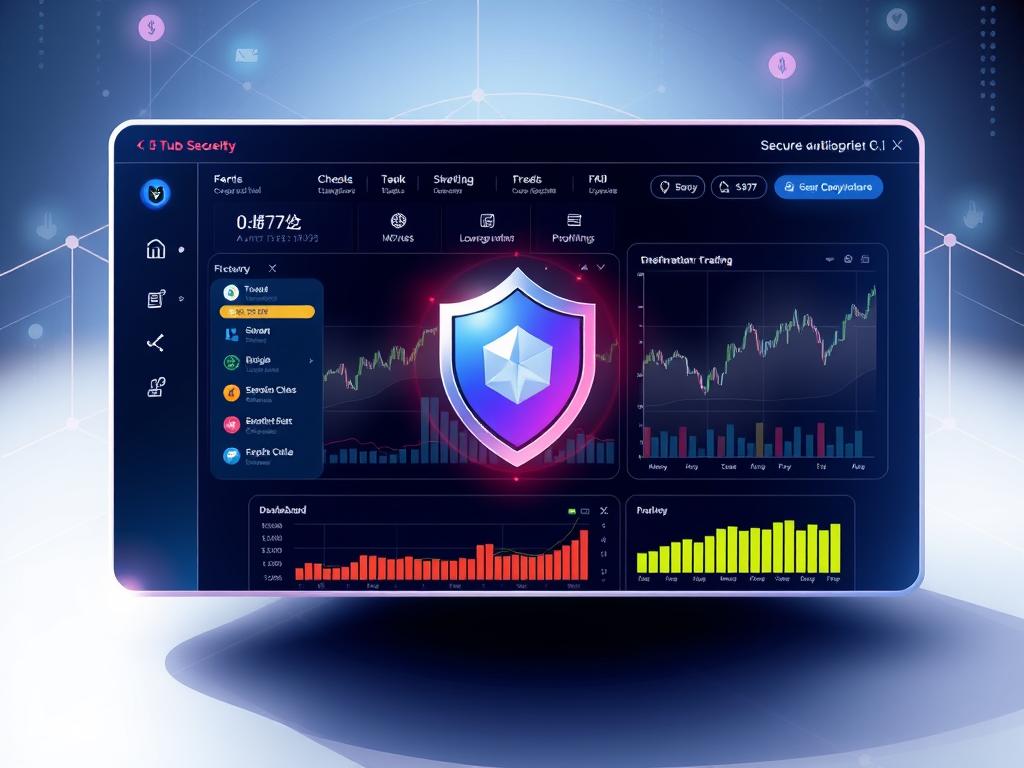Imagine a realm where over 5,500 assets are at your trading fingertips, or where transaction fees can spiral from the allure of zero percent to the discerning high of 0.60%. This isn’t fantasy; it’s the new-normal financial landscape painted by top cryptocurrency platforms revolutionizing the way we think about investment choice. Traders now have a buffet of options ranging from Kraken’s celebrated low fees and support for over 200 cryptocurrencies to Coinbase’s staggering 5,500+ assets and accessibility in 100+ countries, reshaping secure trading platforms globally.
The cadre of contenders vying for traders’ attention doesn’t end there; Crypto.com makes its grand entrance with transaction fees as low as 0.00% and a robust presence in over 90 countries, not to mention supporting a hefty list of over 350 cryptocurrencies. Gemini doesn’t shy away, boasting its user funds insurance and supporting over 80 cryptocurrencies, all while maintaining a competitive fee structure for active traders. As the battleground of digital assets continues to evolve, these platforms stand as beacons for seasoned and nascent traders alike.
Key Takeaways
- Kraken and Coinbase emerge as top cryptocurrency platforms with their extensive support of diverse cryptocurrencies and global access.
- Secure trading platforms like Gemini not only insure user funds but also reinforce trust with competitive fees for active traders.
- Investment choice has broadened with platforms like Crypto.com offering advanced app features, appealing to traders on the move.
- Coinbase’s versatile platform caters to beginners with a user-friendly interface and a colossal asset support system.
- Low transaction fees are a hallmark of some top platforms, strategically positioning them as favorites among cost-conscious traders.
- The platforms’ accessibility across numerous countries indicates a growing reach and influence of cryptocurrency in the global market.
Understanding Centralized vs. Decentralized Crypto Exchanges
When diving into the cryptocurrency market, traders and investors face a crucial decision between using centralized crypto exchanges (CEX) or decentralized crypto exchanges (DEX). Each type has distinct features influenced by regulatory compliance and Know Your Customer (KYC) rules, impacting user experience, security, and financial operations.
Centralized Crypto Exchanges (CEX): Platforms like Coinbase, Kraken, and Binance dominate the global crypto exchange market due to their ability to handle large volumes of transactions, sometimes reaching billions of dollars per month. They function under strict regulatory oversight, making them a reliable option for traders prioritizing security and fast transaction times. CEXs also perform direct fiat to cryptocurrency transactions, which simplifies the process for new users. However, despite rigorous security measures, these platforms remain a target for hacking due to centralized data storage.
Decentralized Crypto Exchanges (DEX): Contrary to CEXs, DEX platforms like Uniswap and Sushiswap offer a peer-to-peer trading environment without the need for a trusted intermediary. Traders on DEXs maintain control of their private keys, thus enhancing security. However, these platforms often have less intuitive interfaces and can lack sufficient liquidity. While DEXs generally have lower fees, they cannot facilitate direct exchanges from fiat to crypto, which can be a barrier for certain users.
| Feature | Centralized Exchanges (CEX) | Decentralized Exchanges (DEX) |
|---|---|---|
| User Interface | User-friendly | Complex |
| Transaction Type | Fiat to Crypto | Crypto to Crypto |
| Fees | Fixed, typically higher | Variable, generally lower |
| Regulatory Oversight | High | Low |
| Liquidity | High | Varies |
| Security Risk | Higher risk of hacking | Lower risk due to decentralized control |
In conclusion, both centralized and decentralized crypto exchanges offer unique advantages and challenges. Traders need to assess their individual needs for security, ease of use, and type of transactions before choosing the right platform. For more detailed insights into each type of exchange and their inherent benefits and drawbacks, visit Centralized vs. Decentralized Crypto Exchanges.
Top Cryptocurrency Platforms for Secure Trading
As the world of cryptocurrency evolves, the importance of security in trading platforms cannot be overstated. With the rise in digital asset exchanges, both centralized and decentralized, maintaining robust security measures is crucial for protecting users’ investments. This section delves into the advanced tools and protocols that leading cryptocurrency platforms employ to ensure a secure trading environment.
Advanced Risk Management Tools
The deployment of advanced risk management tools is a pivotal element in safeguarding trading activities. Top-tier cryptocurrency platforms utilize real-time monitoring systems to swiftly detect and respond to abnormal trading patterns or potential security threats. Additionally, these platforms incorporate fraud detection systems which are vital in preventing unauthorized activities and potential breaches. By integrating these tools, platforms can offer traders a more secure and controlled trading environment, minimizing risks associated with market volatility and cyber threats.
Robust Cybersecurity Measures
To fortify security, reputable cryptocurrency trading platforms implement multi-factor authentication (MFA) procedures. This security measure adds an essential layer of protection by requiring multiple forms of verification before granting access to user accounts, significantly reducing the risk of unauthorized access. In line with this, the provision of encrypted transactions ensures that all data transmitted is safeguarded against interception by malicious entities.
Data Privacy Protocols and Encryption
Ensuring the confidentiality of user information is imperative for trusted cryptocurrency exchanges. These platforms utilize high-level encryption protocols to secure users’ personal and transaction data from potential leaks and hacks. Adherence to strict data privacy measures not only protects users but also enhances trust in the platform’s commitment to security.
Further underscoring their commitment to security, many leading platforms undergo regular audits and show a high degree of transparency in their operational practices. These measures ensure that the platforms remain compliant with evolving regulations and maintain high standards of security and reliability.
Selecting the right platform for cryptocurrency trading involves evaluating these security features critically. With the knowledge that your chosen platform uses comprehensive security measures, you can trade with greater peace of mind, focusing on optimizing your investment strategies in a secure digital environment.
Kraken: A Leader in Low Fees and Advanced Trading
As a cornerstone in the cryptographic trading arena, Kraken distinguishes itself by combining low transaction fees with a professional-grade trading platform. Founded in 2011, Kraken caters to varied trading needs, prominently featuring a multitude of advanced order types. Its sophisticated platform, Kraken Pro, is tailored for in-depth analysis and diverse trading strategies, including futures and margin trading.
Kraken’s competitive edge is significantly highlighted by its fee structure, which starts as low as 0% and generally remains below 0.40%. Such low transaction fees ensure that traders keep a larger portion of their gains. Additionally, despite some regional restrictions and limited funding methods, Kraken maintains high liquidity, which is critical for the execution of large trades without substantial price slippage.
Kraken not only provides low-cost trading but also embraces a broad spectrum of cryptocurrencies, accommodating over 290 coins and facilitating trading across more than 780 pairs.
The platform’s robustness is evident from its operational scale; servicing over 10 million clients and managing a quarterly trading volume surpassing $207 billion. However, it’s important to note specific settlements with U.S. regulatory bodies, such as a $30 million payment to the SEC over its crypto asset staking-as-a-service program. These instances highlight the complexities and evolving nature of compliance in the crypto trading space.
| Feature | Details |
|---|---|
| Average Daily Trading Volume (Spot and Derivatives) | $500 million |
| Client Base | 10 million+ globally |
| Supported Cryptocurrencies | 245 with over 400 markets |
| Fees | 0.00% – 0.40% maker-taker fees |
| Unique Offer | 0% Fees on select AUD market trades |
The firm grasp Kraken holds on diverse market demands, with a suite that includes everything from basic trades to complex strategies like leverage and shorting capabilities, solidifies its position as a top-tier choice for traders seeking a professional-grade trading platform. This is bolstered by comprehensive 24/7 global customer support, ensuring that support is just a call away, anytime and anywhere, further enhancing trader experience on one of the leading platforms with advanced order types.
Coinbase’s User-Friendly Platform for Beginners
Entering the cryptocurrency market can seem overwhelming, but Coinbase has crafted a user-friendly platform tailor-made for beginners. This platform, renowned for its intuitive interface that mimics familiar online banking apps, simplifies the transition to crypto investing. Whether you’re looking to buy your first Bitcoin or diversify into altcoins, Coinbase’s straightforward navigation and clear instructions demystify the process.
Easy-to-Use Interface
Functionality meets design with Coinbase’s interface, which ensures that even those new to digital currencies can start trading with confidence. The platform supports over 240 cryptocurrencies, providing a broad market scope within a secure environment. Additionally, for those who prefer to trade on the go, Coinbase’s mobile application combines robust functionality with convenience, aligning with modern usage patterns.
Security Measures and User Protections
Security is paramount in the digital currency space, and Coinbase stands out with its strong commitment to protecting user assets. Incorporating secure payment gateways and FDIC-insured bank accounts for US customers, users can rest assured that their fiat and cryptographic assets are handled with utmost care. Furthermore, Coinbase operates under strict regulatory compliance, ensuring it adheres to legal and ethical standards across various jurisdictions.

Recognizing the varying needs of its users, Coinbase offers both custodial and non-custodial wallet options—empowering users with the choice of managing their private keys or entrusting Coinbase with their assets’ security. This flexibility not only enhances security but also gives users control according to their preference and technical comfort levels.
| Platform | Launch Year | Supported Cryptocurrencies | Special Features |
|---|---|---|---|
| Coinbase | 2012 | 240+ | User-friendly interface, FDIC insurance, direct paycheck deposit option |
| Kraken | 2011 | 200+ | Advanced security features |
| Bitget | 2018 | 550+ | Large selection of tokens |
| MEXC | 2018 | 2300+ | Broad market access |
| Binance | 2017 | 600+ | High trading volume |
As more individuals seek entry into the cryptocurrency markets, platforms like Coinbase continue to evolve, keeping simplicity, security, and accessibility at the forefront of their offerings. Through continuous enhancements and a strong focus on regulatory compliance and user protection, Coinbase aims not only to be an entry point into cryptocurrency trading but also a reliable, long-term partner in financial innovation.
Crypto.com: Best Mobile App for Crypto Trading
Catering to a massive user base with over 100 million users worldwide, Crypto.com stands out with its crypto mobile app designed for extensive digital asset trading. Since 2016, this platform has continually evolved, enhancing its reputation by integrating pioneering features that furnish a seamless and user-friendly experience.
At the core of Crypto.com’s allure is its robust trading engine, boasting a 64 million TPS matching speed and a miniscule 370-nanosecond core latency, ensuring swift and efficient trading operations. Security also takes precedence, as evidenced by several prestigious accreditations such as SOC2 Type 1 Compliance and ISO/IEC 27001:2013, ensuring traders’ peace of mind.
| Feature | Description | Benefits |
|---|---|---|
| Crypto.com Visa Card | Offers up to 8% back in CRO on all spend with no annual fees. | Maximizes everyday transactions into earning opportunities. |
| Crypto Earn | Opportunity to earn interest by staking cryptocurrencies. | Provides up to double-digit reward rates on crypto holdings. |
| DeFi Wallet | Allows for swapping DeFi coins and earning Triple Yield with no lock-up period. | Facilitates high flexibility and stable returns in DeFi investments. |
Enhancing the appeal, Crypto.com’s mobile app makes purchasing major cryptocurrencies like Bitcoin and Ethereum straightforward, supporting 20+ fiat currencies via credit/debit card. Furthermore, users can set up recurring purchases to automate their investment strategy.
The platform’s vision, “Cryptocurrency in Every Wallet™,” reflects its dedication to widespread adoption. With features like Crypto Pay, which enables payments in over 30 cryptocurrencies and earns rewards, and the Rewards+ loyalty program, Crypto.com is pioneering avenues for integrating crypto into everyday finance.
Enhancing Trader Experience with Gemini’s Security Focus
As a highly liquid exchange, Gemini has consistently prioritized user safety alongside market offerings. Established in 2014 in New York City, Gemini has tailored its operations to foster a secure trading environment that effectively supports both new and veteran traders across over 70 countries.
At the heart of Gemini’s approach to security is the implementation of robust measures like two-factor authentication (2FA), which is a mandatory feature for all users. This attention to security is underscored by Gemini’s distinction of being the first exchange in the world to obtain SOC 1 Type 2 and SOC 2 Type 2 certifications, emphasizing its commitment to high operational standards.
High-Level Operational Security
Gemini’s operational security is comprehensive, integrating advanced technologies and strict protocols to safeguard user accounts and assets. For instance, Gemini enhances its two-factor authentication with support for hardware security keys like Yubikey, providing an additional layer of security against the vulnerabilities of less secure forms of 2FA.
Moreover, their approach includes unique features such as address allowlisting, which lets users restrict cryptocurrency withdrawals only to pre-approved addresses. This not only mitigates risks of unauthorized transactions but also builds a fortress-like environment for user funds.

Insurance and Compliance Strategies
One of the standout features of Gemini is its hot wallet insurance. Ensuring user funds are protected from cyber-attacks and system breaches, this provision offers traders peace of mind, knowing their investments are secure against potential threats. Additionally, U.S. dollar deposits with Gemini are safeguarded through FDIC insurance, reflecting its stringent compliance with regulatory norms.
Gemini’s compliance framework extends across all operations, certified under ISO/IEC 27001:2013 for its information security management and achieving PCI DSS compliance to protect cardholder data. These certifications not only validate Gemini’s security and compliance but also reiterate its role as a trusted leader in the cryptocurrency exchange space.
In this way, Gemini’s focus on high-level operational security and proactive insurance and compliance strategies are foundational to their reputation as a secure, highly liquid exchange capable of delivering exceptional trader experiences. This commitment to safety and regulatory adherence makes Gemini a preferred platform for traders looking for reliability and comprehensive security in their cryptocurrency trading endeavors.
Redefining Investment with Fidelity and InteractiveBrokers Crypto Services
As the financial landscape continually evolves, traditional brokerage firms such as Fidelity and InteractiveBrokers are pivotal in integrating cryptocurrency services into their offerings. This integration not only expands their market reach but also provides familiar and secure avenues for clients seeking cryptocurrency exposure alongside traditional investment options.
Fidelity has begun to offer its clientele a straightforward approach to invest in major cryptocurrencies like Bitcoin and Ethereum, appealing substantially to those new to the crypto markets. On the other hand, InteractiveBrokers has positioned itself robustly within the space by catering to more seasoned traders with an advanced stock trading platform that supports not only cryptocurrencies but also a variety of other asset classes.
Below is a comparative analysis highlighting some key differentiators between Fidelity and InteractiveBrokers:
| Feature | Fidelity | InteractiveBrokers |
|---|---|---|
| Investment Options Ranking | #3 | #1 |
| No Transaction Fee Mutual Funds | 3401 | 4782 |
| Customer Service Rating | 9.31/10 | 7.7/10 |
| Margin Rate for Accounts under $25K | 13.575% | 7.83% |
These features reflect how both firms invest in technology and client services to make cryptocurrency exposure as seamless as possible, enhancing the overall user experience on their platforms.
While both firms offer significant advantages, the choice between Fidelity and InteractiveBrokers often comes down to specific trader needs—whether one values a broader range of investment options or superior customer service, for instance. As traditional brokerages continue to evolve, they are set to play an indispensable role in shaping how both new and experienced investors interact with the crypto market, embodying a blend of innovation and reliability.
Comparing Fees and Accessibility Across Platforms
As the digital financial landscape burgeons, the cost of engaging with cryptocurrency is a pivotal aspect that traders must weigh with care. Centralized and decentralized platforms present varied transaction fees, with an intricate structure often correlating with transaction volumes—a strategy that could be overwhelming for newcomers. Notably, platforms like Coinbase have honed the balance between accessibility and cost, promoting a pragmatic approach for those new to the market, while Kraken’s reputation for low fees continues to attract seasoned traders.
Structuring the Transaction Fees
Platforms such as Gemini and Kraken have catered to over 10 million and expansive cryptocurrency varieties, respectively. Meanwhile, MEXC’s robust engine impressively processes voluminous transactions, seemingly aligning with the demands of high-frequency traders. Nonetheless, ventures like Uniswap and Matcha throw a curveball, challenging the status quo with dynamic fee models and cost-effective routes for trading. Traders are drawn to the latter for their promise of minimized fees and enhanced price performance, especially on substantial trades where every fraction of a percentage in savings matter.
Accessibility and Global Reach
Regarding global cryptocurrency adoption, platforms are not created equal. Accessibility is crucial, with services like Gemini available in over 70 countries, contrasting starkly with others that maintain a more confined operational scope. The variations among exchanges in their country reach, not to mention the disparate cryptocurrency support from Bitget’s 550+ to MEXC’s 1,700+, shape the demographic and strategic decisions of global investors. DEXs like Uniswap and Binance are pioneering in this aspect, striving to enhance worldwide engagement with cryptocurrencies through comprehensive offerings.
Regulatory Compliance and Its Impact
The intersection of regulation and cryptocurrency is complex but crucial. Compliance with Know Your Customer (KYC) rules affects not only the security but also the inclusivity of services. It steers secure trading experiences while molding the industry’s framework for broader accessibility. Exchanges diligently navigate this terrain, with Coinbase offering educational rewards and Kraken maximizing liquidity, all while adhering to the regulatory requisites that ensure the integrity of digital assets and fortify the trust of users worldwide.
